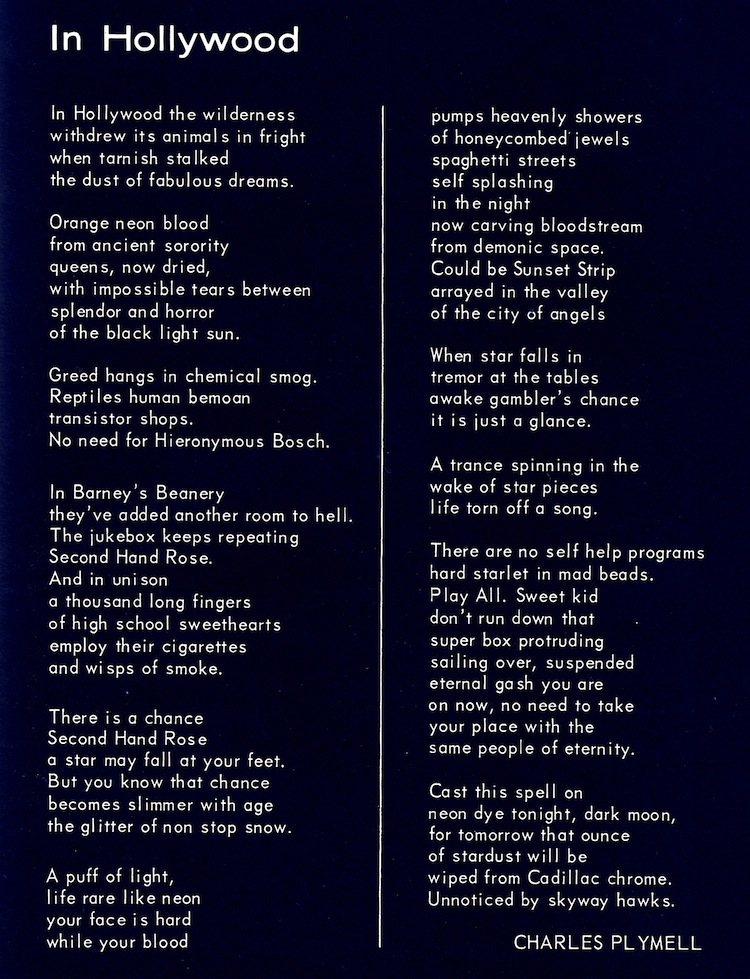~ Plymell and his Pathos in the Towns
... the best figurative poetry speaks not to the frivolous intellect, but (if anything does) straight to the heart; and does it better than plain prose. There seems then to be something which is better said with metaphor than without, which goes straighter to its mark by going crooked, and hits its aim exactly by flying off at tangents.
— Austin Farrer, who died in the year of the Soviet invasion of Czechoslovakia - 1968
Going Home
For the Kanza (in the manner of Rihaku)
Great Mountains formed the eastern slope,We Rarely Find Our Home of Our Childhood
Shallow rivers stretch their ancient beds;
Here a new stream must separate our trail,
To forget a thousand miles of dead commerce,
And wrap our minds to a floating white cloud.
While the sunset washes the unrevealed eye,
We bow and clasp our hearts to the distance
That every living creature knows we left.

It may be too easy to take Charles Plymell for granted. After all, he is one of the greatest poets of the Twentieth Century. Perhaps we all conclude that we understand why. . .
How Are Two Small Canadian Films Making A Splash In Hollywood?

Partly it’s by letting Canada be Canada. “While movies and TV series are shot across the country, the Canadian locations rarely stand in for themselves. Toronto might be New York. Or Vancouver is meant to be L.A. It’s less common to have uniquely Canadian stories — and cities — stand on their own.” – CBC
- Big Movies Squash The Rest: Hollywood is having an inequality moment. The middle class movies are disappearing, and big franchise movies have squeezed out everything else. “This year, a huge chunk of total sales went to a handful of titles. The top 10 films at the domestic box office have accounted for 38% of ticket sales so far this year, according to data firm Comscore. That’s up from 33% in 2018 and 24% five years ago.” What does this mean for audience? Franchise movies with built-in fan bases rule because they’re safer bets. But that is narrowing out creativity. So where is the creative talent going? TV.
- How Big Data Is Changing Music: Figuring out what music will be commercially successful is getting to be more algorithmically scientific. Analysts claim it’s not only possible to see who’s blowing up now, but more importantly, who’s going to be blowing up next. Chartmetric says it can shortlist which of the 1.7 million artists it tracks will have a big career break within the next week. This is changing how artists are picking music and how it gets made. And audiences? Algorithms reinforce existing taste and amplify it. Is our taste being narrowed?
- Do Music Genres Still Exist? Arguably, genres are a marketing device, a way of classifying music in ways that direct listeners. But artists have always resisted genres. And increasingly so are audiences. Music critics may resist the idea, but “what if the genre killers are right? What if it doesn’t matter whether they’re right, but it’s happening anyway? Start to finish, 2019 gave us plenty of evidence.”
- Why Some Bands Are Quitting Encores: Encores are largely about vanity. The show “ends” three-quarters through, then the band leaves the stage to be coaxed back by prolonged audience encouragement. But the banality of encores has long been a frustration for some musicians, but, in recent years, a growing number of notable acts have taken a stand against performing them at all.
